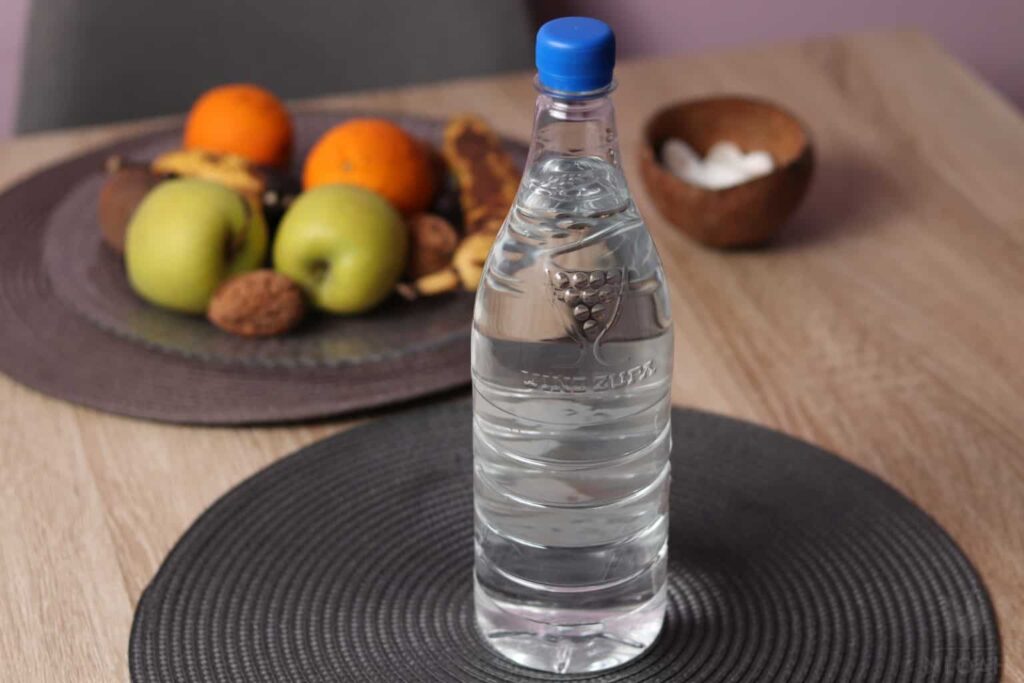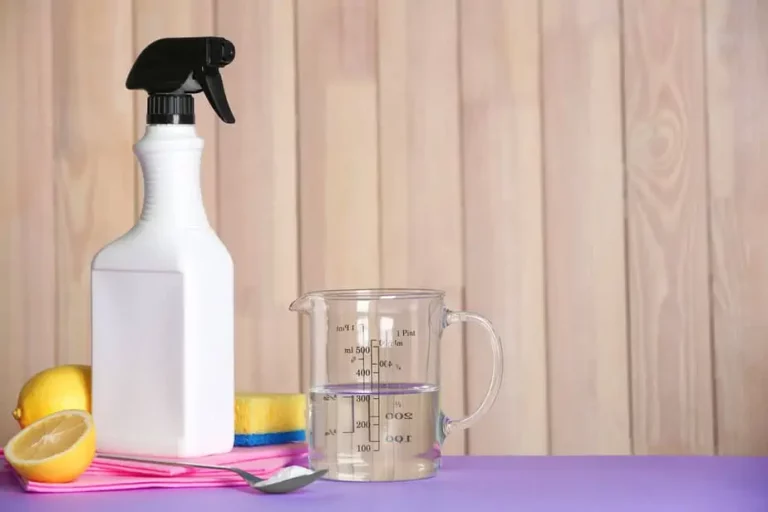Vinegar can help deter carpet moths but may not be a guaranteed solution. It can be used as a repellent, a cleaning agent, and may kill larvae when applied directly. However, it’s most effective as part of a broader prevention strategy. To combat carpet moths:
- Vacuum carpets regularly to remove dirt and larvae.
- Store natural fiber items in airtight containers to prevent infestations.
- Keep the environment cooler and drier to discourage moths.
- Consider introducing natural moth predators.
- Use pheromone-based traps to catch adult male moths.
How to create a vinegar-based moth repellent?
Here the process to create a Vinegar-Based Repellent Spray :
| Process | Description |
| Ingredients | Equal parts of white vinegar and water. Optional: A few drops of essential oils like lavender or cedar oil. |
| Mixing Instructions | Combine vinegar and water in a spray bottle. Shake well for thorough mixing. |
| Scent Variation | Vinegar’s scent is unappealing to many insects, including moths, making it a natural repellent. |
| Spray Application | Apply the solution on carpets, rugs, and areas with suspected moth activity. Focus on edges, corners, and areas with stains or spills, as they attract moths. |
Application of Vinegar on Carpets to Deter Moths

Applying vinegar is a preventive measure to discourage moths from infesting carpets.
It’s recommended to apply the vinegar solution periodically, especially in areas prone to moth activity or where you store woolen items.
Regularly inspect the treated areas for signs of moth activity, such as eggs or larvae, and reapply the solution as needed.
Effectiveness of Vinegar as a Deterrent
While vinegar can be an effective natural deterrent, its effectiveness may vary depending on the severity of the infestation and the specific species of moths.
Using vinegar should be part of a comprehensive strategy that includes other preventive measures like proper storage and cleanliness.
Furthermore, the vinegar scent may dissipate over time, so reapplication may be necessary to maintain its effectiveness.
What’s the vinegar cleaning solution recipe?
The Importance of Cleanliness in Preventing Carpet Moth Infestations :
Attractiveness to Moths: Moths are attracted to soiled or stained areas in carpets, as these provide a source of food for their larvae.
Regular Cleaning: Regular vacuuming and cleaning help remove dirt, debris, and organic matter that can attract moths.
Stain Removal: Promptly treating and removing stains from carpets is crucial to prevent moth infestations.
Preparing a Vinegar Cleaning Solution
To prepare a vinegar cleaning solution, mix equal parts of white vinegar and water. Ensure proper ventilation when using vinegar indoors, as the smell can be strong.
Some people add a small amount of dish soap to the solution for added cleaning power.
Properly Cleaning Carpets with Vinegar
Apply the vinegar solution to stained or soiled areas of the carpet.
Blot. Use a clean cloth or sponge to blot the area, rather than rubbing it, to avoid spreading the stain. After applying vinegar, rinse the area with plain water and blot dry.
For general carpet cleaning, dilute the vinegar solution and use a carpet cleaning machine if available, following the manufacturer’s instructions.
How to control temperature and humidity to deter moths?
Creating the ideal environment to deter moths begins with precise control of temperature and humidity levels
Understanding Vinegar’s Pesticidal Properties
Vinegar contains acetic acid, which can have pesticidal properties and disrupt the pH balance in the bodies of insects.
When vinegar comes into contact with insects, including moth larvae or eggs, it can potentially disrupt their cell membranes, leading to dehydration and eventual death.
Vinegar primarily acts as a contact insecticide, meaning it must come in direct contact with the insect to be effective.
Application of Vinegar Directly to Moth Larvae or Eggs
To use vinegar effectively, you need to identify areas where moth larvae or eggs are present. These may be found in secluded, hidden areas of carpets, such as underneath furniture or along carpet edges.
Apply vinegar directly to the larvae or eggs using a spray bottle or a cloth soaked in the vinegar solution. Ensure thorough coverage.
Regularly inspect treated areas to check for the effectiveness of vinegar in killing the larvae or eggs. You may need to reapply if necessary.
Limitations of Vinegar in Killing Carpet Moths
Vinegar’s effectiveness in killing carpet moths may vary. It’s more likely to work on contact with smaller or younger larvae or eggs. Larger and more mature larvae may be less affected.
Moth eggs are covered in a protective substance that can make them less susceptible to vinegar. Ensuring vinegar reaches the eggs’ inner layers may be challenging.
While vinegar can be a useful tool in combating carpet moths, it should be used as part of a broader strategy that includes preventive measures and monitoring. It may not be sufficient on its own to eliminate a serious infestation.
In cases of severe infestations, or if vinegar proves ineffective, it is advisable to consult with a professional pest control service. They can provide more potent and targeted treatments.
How to introduce natural predators to combat carpet moths?
Regular cleaning and maintenance of carpets are crucial in preventing carpet moth infestations.
Vacuuming helps remove dirt, debris, and food sources that attract carpet moths, such as skin flakes, pet hair, and food crumbs.
Vacuum carpets and rugs at least once a week, paying special attention to high-traffic areas, edges, and hidden spaces under furniture.
Proper Storage of Natural Fiber Items
Store woolen and natural fiber items like clothing, blankets, and rugs in airtight containers or garment bags when not in use. This prevents moths from accessing and damaging them.
Ensure that items are clean and free of moth larvae or eggs before storing them, as moths can infest stored items over time.
Temperature and Humidity Control
Carpet moths thrive in warm, humid environments. Controlling temperature and humidity levels can discourage their presence.
Use dehumidifiers to maintain a lower humidity level, especially in areas prone to moisture buildup.
Introduction of Natural Predators
Consider introducing natural predators of moths, such as certain types of parasitic wasps or nematodes, into your home.
These predators can help control moth populations naturally by parasitizing or preying on the moths.
Use of Moth Traps
Moth traps containing pheromones can be effective in monitoring and trapping adult male moths. This disrupts their mating cycle and reduces the likelihood of egg-laying.
Place traps in areas where moth activity is suspected, such as closets or near carpets and rugs.
How to effectively use pheromone-based moth traps?
If a carpet moth infestation is severe and widespread, vinegar may not be enough to address the problem effectively.
Complementary Solutions: In such cases, it’s essential to employ a combination of methods, including professional-grade moth control products and measures.
The Importance of Professional Pest Control Services
Pest control professionals have the knowledge, experience, and access to specialized products to address severe carpet moth infestations.
They can thoroughly inspect your home to identify the extent of the infestation and locate hidden areas of moth activity.
Professionals can provide targeted treatments, such as pesticide application, fumigation, or heat treatments, to eliminate the infestation.
Pest control experts can also offer advice on long-term prevention to minimize the risk of future infestations.
FAQ’s
How long does vinegar take to kill moths?
Vinegar’s effectiveness in killing moths can vary, but it usually takes a few minutes to hours upon direct contact.
Does spraying vinegar kill moths?
Spraying vinegar directly on moths can kill them if they come into contact with it.
How do I get rid of carpet moths permanently?
To get rid of carpet moths permanently, combine strategies like thorough cleaning, proper storage, temperature control, introducing natural predators, and using traps. Professional pest control may be necessary for severe infestations.
Do moths hate white vinegar?
Moths dislike the strong scent of white vinegar, making it a natural repellent.
Does vinegar spray kill moth eggs?
Vinegar may not effectively penetrate the protective coating of moth eggs, limiting its ability to kill them.
What smell kills moths?
Moths are deterred by strong-smelling substances like white vinegar, cedarwood, lavender, and cloves. These scents can help repel them.
Conclusion
To sum it up, stopping carpet moth problems isn’t as simple as just using vinegar. While vinegar can help a bit by scaring away moths and killing some of their babies, it’s only part of the solution. You also need to regularly clean and take good care of your carpets, store your woolen stuff properly, and control the temperature and humidity in your home. You can even bring in some natural enemies of moths or use special traps to keep them away.
But if things get really bad, like if you have a big moth invasion or vinegar isn’t doing the trick, don’t hesitate to call in the professionals. These pest control experts know exactly what to do. They can figure out how bad the problem is, use powerful treatments, and give you advice on how to keep moths away for good. So, remember, it’s all about combining different tricks and getting help when you need it to keep your carpets and clothes safe from those pesky moths!

